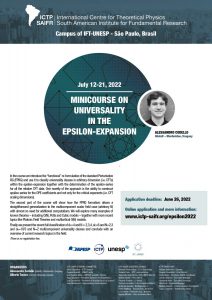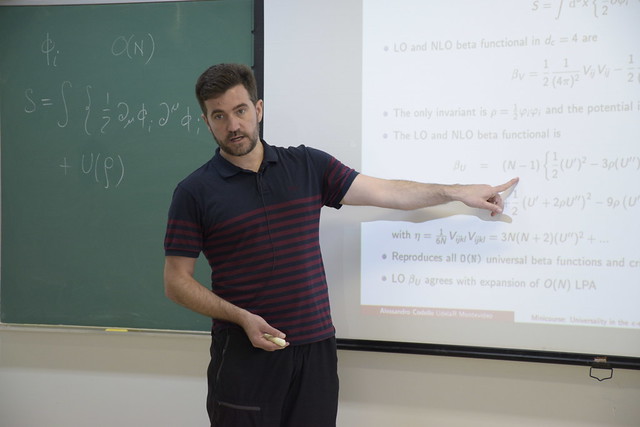Minicourse on Universality in the Epsilon-Expansion
July 12-21, 2022
ICTP-SAIFR, São Paulo, Brazil
Room 3 of IFT-UNESP
Home
In the course we introduce the “functional” re-formulation of the standard Perturbative RG (FPRG) and use it to classify universality classes in arbitrary dimension (i.e. CFTs) within the epsilon-expansion together with the determination of the epsilon-series for all the relative CFT data. One novelty of the approach is the ability to construct epsilon-series for the OPE coefficients and not only for the critical exponents (i.e. CFT scaling dimensions).
In the single component case, universality classes are represented by renormalizable scalar QFTs with self-interacting potentials of highest monomial φ^m below their upper critical dimensions d_c = 2m/(m -2). For even integers, m ≥ 4 these theories coincide with the Landau-Ginzburg description of multi-critical phenomena and interpolate with the unitary minimal CFTs in d = 2, while for odd m the theories are non-unitary CFTs and start at m = 3 with the Lee-Yang universality class. An important outcome of this functional analysis is the realization of the existence of a new non-trivial family of d = 3 universality classes with upper critical dimension d_c = 10/3.
The second part of the course will show how the FPRG formalism allows a straightforward generalization to the multicomponent scalar field case (arbitrary N) with almost no need for additional computations. We will explore many examples of known theories – including O(N), Potts and Cubic models – together with more recent topics like Platonic Field Theories and multicritical O(N) models.
Finally we present the recent full classification of d_c=4 and N = 2,3,4, d_c=6 and N=2,3 and d_c=10/3 and N=2 multicomponent universality classes and conclude with an overview of current research topics in the field.
There is no registration fee.
Lecturer:
- Alessandro Codello (UdelaR – Montevideo, Uruguay)
Organizers:
- Alessandro Codello (UdelaR – Montevideo, Uruguay)
- Alberto Tonero (Carleton University, Canada)
Satisfaction survey:
Click HERE
Registration
Photos
Program
From 2 – 4 pm on:
- July 12 – L1 – Functional Perturbative RG (1) – Loop expansion, renormalization, upper critical dimensions and beta functionals
- July 13 – L2 – Functional Perturbative RG (2) – Fixed points and classification of one component universality classe
- July 14 – L3 – CFT data in the epsilon expansion
- July 19 – L4 – Multi-component beta functionals with applications to O(N), Potts, Cubic and Platonic field theories
- July 20- L5 – General N RG flows and emergent symmetry
- July 21 – L6 – Classification of N=2 and N=3 universality classes and some new N=4 fixed points. Conclusion and open problems
Videos and Files
Mathematica notebooks: HERE
Slides of the Lectures: HERE
2022-07-12-
14:00 - Alessandro Codello (UdelaR):
Functional Perturbative RG (1) – Loop expansion, renormalization, upper critical dimensions and beta functionals
-
14:00 - Alessandro Codello (UdelaR):
Functional Perturbative RG (2) – Fixed points and classification of one component universality classe
-
14:00 - Alessandro Codello (UdelaR):
CFT data in the epsilon expansion
-
14:00 - Alessandro Codello (UdelaR):
Multi-component beta functionals with applications to O(N), Potts, Cubic and Platonic field theories
-
14:00 - Alessandro Codello (UdelaR):
General N RG flows and emergent symmetry
-
14:00 - Alessandro Codello (UdelaR):
Classification of N=2 and N=3 universality classes and some new N=4 fixed points. Conclusion and open problems
asdasdasd
Additional Information
COVID-19: Fully vaccinated Brazilians and foreigners are now exempt from presenting proof of a COVID-19 test with a negative or non-detectable result. You are only required to present proof of vaccination, printed or electronically. See requirements for travelling to Brazil at https://www.latam.com/
Visa information: Nationals from several countries in Latin America and Europe, Australia, Canada, Japan and USA are exempt from tourist visa. Please check here which nationals need a tourist visa to enter Brazil.
Hotel recommendation: http://www.ictp-saifr.org/hotel-recommendations-2.
How to reach the Institute: The minicourse will be held at ICTP South American Institute, located at IFT-UNESP, which is across the street from a major bus and subway terminal (Terminal Barra Funda). The address which is closer to the entrance of the IFT-UNESP building is R. Jornalista Aloysio Biondi, 120 – Barra Funda, São Paulo. The easiest way to reach us is by subway or bus, please find instructions here.
Yellow fever vaccination is recommended for travellers going to Brazil. Note that the vaccine needs to be taken at least ten days before the trip to be effective.


